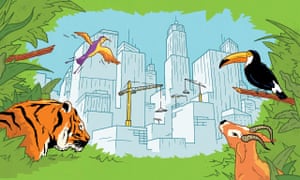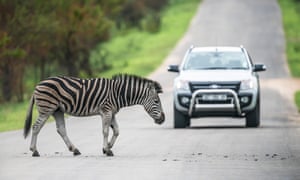Extract from The Guardian
We weep at the disappearance of
endangered species but avert our eyes to the causes of Earth’s
destruction
Monday 19 December 2016 18.00 AEDT
A baby ibex on a precipitous cliff edge. The hyenas of Harar eating from a human hand. Leopards in Mumbai, whales breaching and baby turtles heading blindly away from the sea. We are amazed by images of wildlife seen in ever more beautifully filmed natural history documentaries. They raise awareness, entertain, inform and amuse. We weep when we hear there are fewer birds in the sky, or that thousands of species are critically endangered. But there are some metaphorical megafauna that the BBC and we in the media really do not want everyone to see.
After half a lifetime writing for the Guardian about the decline of the natural world, I have to report that there is a herd of enormous elephants in the forest that are trashing the place. We avert our eyes and pretend they are not there. We hope they will go away, but they appear to be breeding. But it is now clear that they are doing so much damage that unless confronted, there is little chance that the rest of the animals, including us, will survive very long.
Embracing hyper-consumerism
Hyper-consumerism is the dominant matriarch of this destructive herd and the dysfunctional economic model that supports it, generating waste and ecological damage on a massive scale. The average US supermarket offers nearly 50,000 products; in the UK we throw away millions of tonnes of food a year; mobile phones have an average lifespan of just over a year; computers and cars just a few years more. The free market economy that has been built around it celebrates speed, obsolescence and quantity over longevity and efficiency. But we know that hyper-consumerism leads directly to deforestation, over-extraction of minerals, the waste of natural resources and pollution. We simply have too much stuff that no one possibly needs. To avoid ecological disaster, it must be culled.Letting corporate power off the leash
Corporate power is the adult male of the herd. The biggest 200 corporations now rule the world, and are economically greater than the combined economies of nearly 180 countries. They employ just a few million people but they wield power over governments and global bodies and have more economic influence than 80% of humanity. Together they set the world’s technological and economic direction, govern trade and industry, the burning of fossil fuels, and the sale and distribution of much of what we eat and grow. Together they must bear most responsibility for the deterioration of nature. They have been directly linked to devastating ecological and financial crimes, they avoid tax, and they mostly have their own way with national governments. Their plastic pollutes the remotest seas, their oil leads to climate change and their electronic waste continues to mount inexorably. Corporate power must be reined in.‘Wayward youngster of the herd is the car.’ Photograph: Alamy
Driving dangerously
The car is the wayward youngster of the herd. There will soon be two billion vehicles on the world’s roads, of which fewer than about a tenth of half of 1% could possibly be called green. But it is not just the air that they poison, or the greenhouse gases that are emitted when they are being built or driven. Doing just as much damage to nature and wildlife are the roads themselves – which, in under a century, have been driven deep into every area on Earth, destroying forest and coast and opening up and fragmenting habitat. The car has come to dominate the way cities grow, but now cars determine where people live, and how they travel and even die. In 20 years the number of cars on the roads is expected to double. But cars have no absolute right to pollute or proliferate like this. They, too, must be culled.The one nobody wants to talk about
Human population. No one wants to talk about this, but between 1960 and 1999, almost unnoticed, numbers doubled from three to six billion people (pdf). They now stand at nearly 7.5 billion, and by 2050 there will be nine or possibly 10 billion people on Earth, all wanting cars, computers and other stuff. The ecological problem this causes is both from the sheer numbers and from how much each human consumes. One billion people living in absolute poverty may not have a vast impact on the natural world; but the same number living the lifestyle of an American or a European is very damaging. Because people everywhere are encouraged to aspire to consume more and more, there is little hope that the pressure on resources and the environment can be relieved soon. Population pressure is barely on the political or economic agenda of any rich country.Giraffes facing extinction, warn experts – video report
Losing soil
Soil is another ecological elephant in the room that no one wants to talk about. It teems with life, yet because of bad farming and forestry practices, it is being washed away very many times faster than it is being replenished. On soil’s health depends much of the world’s food and water supplies, the growth of most plant and insect life and therefore the food of life itself. According to some studies, its accelerating loss is now second only to population growth as the biggest environmental problem the world faces. As a direct result of soil erosion, possibly 30% of the world’s arable land has become unproductive in just 40 years, leading to severe declines in bird and animal life. Soil is the most precious of all resources, yet in one country after another it is being allowed to wash or blow away. History shows that civilisations founder when farm productivity declines – usually as a result of soil mismanagement. It must be conserved.Fostering inequality
Inequality, which now impacts on the natural world, may be the little sister of them all. Aside from fostering resentment between rich and poor people, there is mounting evidence that it causes environmental degradation. The greater the income difference between groups, or countries, the greater the waste, the meat and water consumption, and the biodiversity loss. People in the most unequal societies are more stressed and anxious, and under greater pressure to consume more. Hyper-consumption by the few reduces the satisfaction of the many with what they have, by showing it up as inferior. It may also undermine the collective action required to protect nature.… and poverty
Poverty in developing countries and the rampant illegal wildlife trade is the progeny of the lot. This is now the largest single threat to many species. The trade, which is worth several hundred billion dollars a year, is not just from the poaching of horn or tusks from charismatic megafauna such as rhino and elephants, but the systematic denuding of wild places on an industrial scale. According to the global monitoring network Traffic, some 88m wild orchids, 6.2m wild-caught live birds, and 7.5m live-caught reptiles were traded globally between 1996 and 2001. Other records show more than 100m tonnes of fish, 1.5m live birds and 440,000 tonnes of medicinal plants being traded illegally every year. Driving the trade are rich consumers who desire products of animals, trees, flowers and fish for medicine, souvenirs, status symbols, building materials and food.We do not have to live with these beasts. They can be ejected from the forest, culled or trained. Wildlife documentaries never point the finger at them and this makes us forget that we humans, too, are living in nature. Either we can wring our hands and carry on watching ever more gorgeous images of wildlife and see nature carry on declining, or we can intervene.


No comments:
Post a Comment